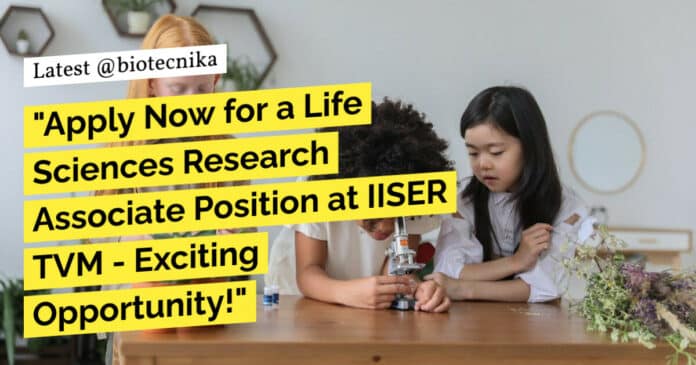IISER TVM PhD Life Sciences Associate Recruitment – Apply Now!
The Indian Institute of Science Education and Research Thiruvananthapuram is one of the premier science education and research institutes established by the Government of India in 2008 to impart high-quality education integrated with outstanding research in modern science. The Institute invites applications for the following positions on a contract basis.
Name of Post: Research Associate
Title of Project: Chromosomal features governing crossover pathway choice
Funding agency: Department of Biotechnology
Minimum Educational qualification (as prescribed by the funding agency): Ph.D in Life Sciences (candidates who have submitted thesis can also apply)
Desirable qualifications:
- The candidate should be highly motivated to do basic research in the field of genome stability using yeast as a model system.
- The candidate should have at least 1 published paper in a peer-reviewed reputed journal.
- Prior experience with molecular biology, genetic, cytology or biochemical studies in yeast is desirable.
Number of posts: 01
Fellowship amount: Rs. 47,000 + HRA
Tenure of the post: One year (extendable on the basis of performance)
Age: Below 40 years with 3-5 years relaxation for SC/ST/OBC/Women and Physically disabled as per government norms
Last date: 31-10-2023
How to apply? Completed applications should be sent by email to [email protected], with the subject line “Application for DBT project: Your Name”. The application should include a detailed resume with one-page summary of PhD work, a publication list, contact details of two referees, a photograph, and scanned copies of educational/professional qualifications. Incomplete applications or applications failing to meet the minimum criteria will be disqualified.
Keywords: IISER TVM recruitment, PhD Life Sciences Associate, Research Associate job, Indian Institute of Science Education and Research, Thiruvananthapuram, Chromosomal features, crossover pathway, genome stability, yeast model system, Department of Biotechnology


























